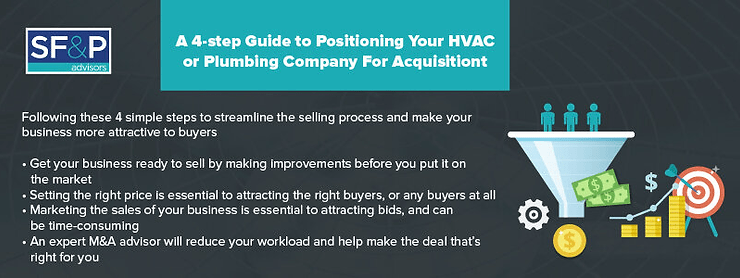Following these 4 simple steps to streamline the selling process and make your business more attractive to buyers
Selling your business isn’t a decision you should enter into lightly. After all, you might have built your company from scratch and turned it into what it is today, so letting it go can be difficult.
Finding a buyer for your business can also offer significant financial benefits for you and your family. Still, you need to handle the selling process correctly to make it worth your while.
The process will include steps like determining a sale price, marketing the company to potential buyers, and negotiating the deal, all of which takes knowledge and experience to get right.
Here’s a look at some steps you’ll need to take before selling your HVAC or plumbing business in the coming years.

1. Improve the business before listing it for sale Before all else, take an honest look at your company to see where improvements are necessary. Going ahead with these changes will make the business more attractive to buyers and help you command top dollar during negotiations.
If you can identify places where improvement is needed, you can bet that a prospective buyer will use those elements to drive the price down. Using a pre-sale checklist that includes topics like business image, financial conditions, legal conditions, business operations, products, transferability, and clientele will give you a good start.
Once you’ve identified where improvements are required, it’s time to develop a plan to make them. Some of these issues will take years to address, so now is also when you should establish a timeline for your exit strategy.
Of course, if you want to make a quick exit, you could always sell the business as-is, but you should also be prepared to accept less than your desired amount when selling.
2. Set a price After establishing your sale timeline and deciding the areas you’ll address for improvement, the next step is setting the asking price.
Keep in mind that your asking price can differ substantially from what a buyer will end up offering you. Both you and the buyer will have different ideas of what is fair value for the company.
At this point, it’s essential to look at what you’re really selling:
- Does your company have a customer list that creates recurring revenue?
- Do you own your building?
- Do you have a prime location?
- Is your brand entrenched in the community?
All of these elements add value to your business and can increase your sale price. Likewise, if you’re only selling because revenues are down and you want an easy out, you should be prepared to lower your asking price.
3. Market to buyers It isn’t enough to throw an HVAC or plumbing company on the market and hope for the best. You’ll get the best results by focusing on specific buyers who are a strategic fit and finding ways to present the business directly to them.
For an HVAC or plumbing company, it makes sense to speak with other local businesses that might be interested in an acquisition. Likewise, nationally branded HVAC or plumbing companies that haven’t yet set up in your community can be excellent strategic targets.
It’s important to take your company’s culture into account, too. If you’ve always focused on creating a casual and relaxed culture within the workplace, a corporate entity might not see a fit with its own internal culture.
A poor fit could end up wasting your time, so it’s essential to vet potential buyers early in the process.
4. Negotiate the deal After finding a buyer fit, it’s time to negotiate the deal. This section is where you and the buyer will determine the final value of the company and figure out when the sale will finalize.
Keep in mind as you negotiate that the buyer will conduct all sorts of research on your business to look for ways to lower its value. Any improvements you didn’t make or other issues that arise could impact what you end up receiving for the business, causing you to walk away with less.
This is where it helps to have experienced negotiators on your side. These negotiations can be time-consuming, and you’ll need a legal team on your side throughout the process. Going it alone is very likely to cost you money on the final deal.
How an M&A advisor can help with your sale Many different elements go into selling your business, so using an advisory firm is highly recommended. These firms help buyers and sellers find each other while understanding what each party needs from the transaction, making it more likely everything goes smoothly.
SF&P Advisors can assist you through the sales process by conducting a business consultation, creating marketing materials, and representing you through negotiations. They have the expertise and experience to make sure your business gets the value you deserve. Contact us today for free business estimate valuation.
